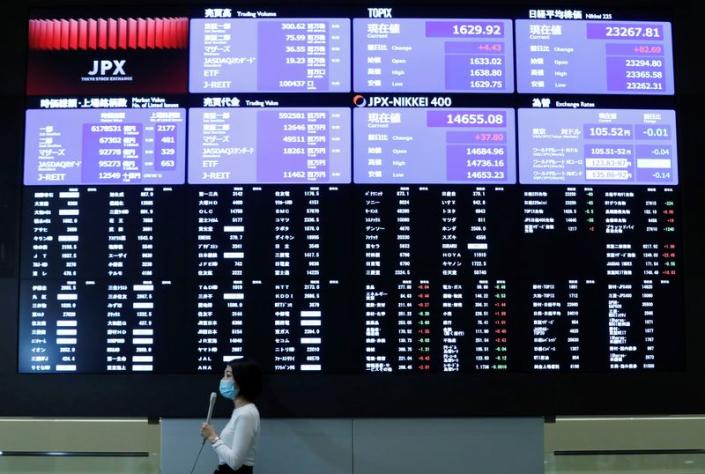Asia’s major stock indexes saw a subdued start to the week with investor risk-appetite low amid a downbeat global economic picture and continuing guesswork on when the US Fed might ease back on interest rates.
Also contributing to the air of caution was speculation Japan’s central bank might edge further away from its uber-easy policies, and traders waiting on a key reading on US inflation.
Japan’s Nikkei share average ended lower as uncertain investors waited on hints from the Bank of Japan (BOJ) Governor Kazuo Ueda over that possible policy shift.
Also on AF: Chinese Chip Designers Hiring Malaysian Firms to Assemble GPUs
The Nikkei share average fell 0.64%, or 211.57 points, to close at 32,758.98, while the broader Topix was down 0.66%, or 15.42 points, to 2,316.86.
The BOJ is holding a two-day policy meeting, which will conclude on Tuesday. Market players are waiting for any comments from Ueda on the timing for the policy shift, even as the consensus is that the BOJ would keep its policy unchanged at this meeting.
The market moved sharply last week after Ueda’s comments fuelled speculation that the BOJ would announce the end of its negative rate policy as early as this month.
China stocks extended their drop, following five weekly losses, as risk sentiment remained weak after recent data showed sluggish economic recovery and policy signals from a top meeting failed to excite investors.
The tone of the highly anticipated annual Central Economic Work Conference last week remained pro-growth, but “there was not much detail on specific easing measures, especially in the property market,” Goldman Sachs said in a note.
The blue-chip CSI 300 Index lost 0.36%, and the Shanghai Composite Index slipped 0.40%, or 11.75 points, to 2,930.80. The Shenzhen Composite Index on China’s second exchange dropped 1.25%, or 22.77 points, to 1,805.44.
In Hong Kong, stocks in tech giants retreated 1.2%, and mainland developers declined 1.9%. The Hang Seng Index lost 0.97%, or 162.96 points, to 16,629.23, while the Hang Seng China Enterprises Index fell 1.16%.
Shares of artificial intelligence (AI) software developer SenseTime Group dropped 11.9% after the firm’s founder Tang Xiaoou died late on Friday.
Elsewhere across the region, in earlier trade, Sydney, Singapore, Mumbai, Bangkok, Taipei, Manila and Jakarta were also in the red. Seoul and Wellington eked out small gains, however. MSCI’s broadest index of Asia-Pacific shares outside Japan dipped 0.3%.
US Dollar Dips
S&P 500 futures inched up 0.3%, while Nasdaq futures added 0.2%. Eurostoxx 50 futures slipped 0.3% and FTSE futures 0.1%.
Over in the United States, a reading on core personal consumption expenditure (PCE) index is forecast by analysts to rise 0.2% in November with the annual inflation rate slowing to its lowest since mid-2021 at 3.4%.
Markets reckon the slowdown in inflation means the Fed will have to ease policy just to stop real rates from rising, and are wagering on early and aggressive action.
Two-year Treasury yields ticked up only slightly in response, and still ended the week down a steep 28 basis points at the lowest close since mid-May. Yields on 10-year notes stood at 3.91%, having dived 33 basis points last week in the biggest weekly fall since early 2020.
The market’s dovish outlook for US rates saw the dollar slip 1.3% against a basket of currencies last week, though the Fed is hardly alone in the rate-cutting stakes.
Markets imply around 150 basis points of easing by the European Central Bank next year, and 113 basis points of cuts from the Bank of England.
That outlook restrained the euro at $1.0909, having pulled back from a top of $1.1004 on Friday. The dollar was looking more vulnerable against the yen at 142.23, having slid 1.9% last week.
Oil prices were trying to steady after hitting a five-month low last week amid doubts all OPEC+ producers will stick with caps on output.
Lower exports from Russia and attacks by the Houthis on ships in the Red Sea offered some support. Brent nudged up 47 cents to $77.02 a barrel, while US crude rose 47 cents to $71.90.
Key figures
Tokyo – Nikkei 225 < DOWN 0.64% at 32,758.98 (close)
Hong Kong – Hang Seng Index < DOWN 0.97% at 16,629.23 (close)
Shanghai – Composite < DOWN 0.40% at 2,930.80 (close)
London – FTSE 100 > UP 0.42% at 7,608.36 (0937 GMT)
New York – Dow > UP 0.15% at 37,305.16 (Friday close)
- Reuters with additional editing by Sean O’Meara
Read more:
Nasdaq-Listed China Shadow Bank Down 60% on Property Crisis Hit
China Tightens Rules for Non-Bank Payment Firms Like Alipay
India Shares See Longest Weekly Winning Streak Since 2018
Hang Seng Gains on Property Boost, Yen Drop Lifts Nikkei























